|
|
|
Sort Order |
|
|
|
Items / Page
|
|
|
|
|
|
|
| Srl | Item |
| 1 |
ID:
190480


|
|
|
|
|
| Summary/Abstract |
This article analyses the content and structure of the Kremlin’s political discourse since the start of Vladimir Putin’s presidency in 2000 and in the context of the conflicts in Georgia and Ukraine (annexation of Crimea and the conflict in Donbas). We apply structural topic modelling (STM) and focus on the official English-language Kremlin transcripts, a total of more than 8,000 texts. Our findings demonstrate that these conflicts became important markers to reveal a gradual shift in the period 2000–2019 away from the prevalence of foreign policy topics to the dominance of domestic issues and Russia’s change of emphasis to bilateral relations with non-Western countries.
|
|
|
|
|
|
|
|
|
|
|
|
|
|
|
|
| 2 |
ID:
147377
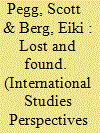

|
|
|
|
|
| Summary/Abstract |
De facto states are typically seen as marginal actors in the international system. Although they control territory and provide governance, their claims to sovereignty remain largely unrecognized. It is widely believed that such entities are either ignored or viewed with hostility by the vast majority of sovereign states. Rather than theoretically presume such relations, we empirically investigate de facto state–great power interactions through the use of a novel data set comprising 448 “WikiLeaks” US diplomatic cables from 2003 to 2010. Specifically, we examine US relations with the four de facto states of Abkhazia, Nagorno-Karabakh, Somaliland, and Northern Cyprus to test four different hypotheses designed to explain what determines the degree of US support or hostility toward individual de facto states. We find that hostility/support and isolation/engagement often go hand in hand, yet vary significantly across our selected cases. De facto states are not treated as homogenous entities and US foreign policy is quite capable of discriminating between them and calibrating its interactions with them.
|
|
|
|
|
|
|
|
|
|
|
|
|
|
|
|
| 3 |
ID:
122983
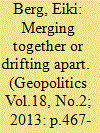

|
|
|
|
|
| Publication |
2013.
|
| Summary/Abstract |
One way to approach conflict management is to use a four-dimensional political legitimacy criterion, which could set the agenda for enhancing peace prospects in Cyprus, Moldova and Bosnia and Herzegovina (BiH). Here the argument is that through measuring the internal legitimacy of conflicting parties and then comparing and contrasting the given empirical values on the scales of cohesion/security and democracy/performance, we may be able to distinguish conflicting pairs either "merging together" or "drifting apart", depending on how the secessionist entities position themselves vis-à-vis their parent states. Empirical facts on the ground tell us that Cyprus may have the biggest chances of reunification, whereas Moldova's perspective looks meagre. The BiH, which has preserved its territorial integrity, faces real secessionist challenges, given the illegitimacy of the state and a manifest dissatisfaction with systemic deficiencies.
|
|
|
|
|
|
|
|
|
|
|
|
|
|
|
|
| 4 |
ID:
110768
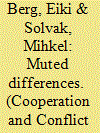

|
|
|
|
|
| Publication |
2011.
|
| Summary/Abstract |
The UNDP report The Silent Majority Speaks (2007) demonstrates widespread consent and a popular desire for change while promoting a single state with strong regions as a compromise model for Bosnia and Herzegovina (BiH). Surprisingly, our own research (2009) on political legitimacy reveals quite the opposite tendencies, where political entities such as the Federation of Bosnia and Herzegovina (FBiH) and the Republika Srpska (RS) more often drift apart than merge together. What strikes us is the fact that the FBiH, which advocates a more integrated state, does not necessarily have more legitimate grounds for achieving that goal than the secessionist counterclaim of RS in its own right. The two entities remain worlds apart on a range of issues and agree only on rather abstract principles of an ideal political order.
|
|
|
|
|
|
|
|
|
|
|
|
|
|
|
|
| 5 |
ID:
114456
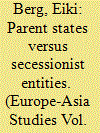

|
|
|
|
|
| Publication |
2012.
|
| Summary/Abstract |
This article questions whether a relatively strong conviction that legitimacy conveys nothing more than acceptance derived from legal recognition. Therefore several indices are constructed which are applicable to comparing and contrasting four major dimensions of political legitimacy both in parent states and in secessionist entities. In measuring political legitimacy in Cyprus, Moldova and Bosnia & Hercegovina in terms of identity and security on the one hand, and democracy and performance on the other, we may be able to observe cases where internal legitimacy has been neglected by the international community. This article concludes that legitimacy is a variable continuously used in the support and rejection of secessionist bids and integrationist endeavours.
|
|
|
|
|
|
|
|
|
|
|
|
|
|
|
|
| 6 |
ID:
089538


|
|
|
|
|
| Publication |
2009.
|
| Summary/Abstract |
Current legal and normative doctrine forbids de jure recognition to those territorial units whose political leadership has been resisted by metropolitan central authorities. Recognition on the basis of uti possidetis juris makes the self-determination of people a territorial issue. This paper presents a framework for conceptualising and analysing the impact of 'indivisible sovereignty' and territoriality dilemmas on self-determination claims, resonating most strongly in the recent Kosovo campaign for independence. It then re-examines seceding motivations and birth-giving processes in Northern Cyprus, Transnistria and Republika Srpska, all which could be defined as self-proclaimed post-conflict entities deemed to gain international recognition. Finally, the paper illustrates the impact of 'Kosovo syndrome' on the preservation of status quo while concluding that the immediate reactions to Kosovo independence diverged from case to case to the extent where Turkish Cypriots found new stimulus for reunification, Transnistrians advocated a new model of conflict resolution and Bosnian Serbs increased their bargaining power.
|
|
|
|
|
|
|
|
|
|
|
|
|
|
|
|
| 7 |
ID:
160772
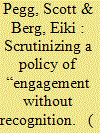

|
|
|
|
|
| Summary/Abstract |
De facto states are conventionally perceived as illegal entities, usually ignored by the rest of the world and therefore also isolated and severely sanctioned in most cases. We investigate US foreign-policy engagement with Abkhazia, Nagorno-Karabakh, Northern Cyprus, Somaliland, and Transnistria and explore when, why, and how interactions between the United States and “places that do not exist” has taken place. This is done by extensively using WikiLeaks diplomatic cables from 2003– to 2010 as a primary information source. We assume that by engaging and not recognizing, the US has sought to increase its leverage and footprint in conflicts that somehow affect its national interests. This engagement approach is presumably most successful when targeted adversaries turn out to be agents of peace and stability, or when strategic calculus outweighs the rationale for the conventional treatment of sovereign anomalies.
|
|
|
|
|
|
|
|
|
|
|
|
|
|
|
|
| 8 |
ID:
189112


|
|
|
|
|
| Summary/Abstract |
This paper explores the geopolitical role that a de facto state may play while operating in the context of patron-client relations and engagement without recognition framework. This is especially pronounced in Transnistria, which due to economic incentives offered by the EU through the Deep and Comprehensive Free Trade Area (DCFTA) may not fit well into the overall military-political or socio-cultural expectations of Transnistrians deemed to be part of the Russian dominion. The puzzle this paper seeks to unfold is twofold: first, it examines the motives and instruments that both EU and Russia exploit in their power projections towards Transnistria; second, it probes different avenues how de facto state authorities tackle possible tensions emerging from externally imposed choices, and how this all affects their role choice. It is not ruled out that regional linkages, also interests and needs that shape allegiances will lead to changes in geopolitical roles, and thus in the secessionist conflict dynamics.
|
|
|
|
|
|
|
|
|
|
|
|
|
|
|
|
| 9 |
ID:
069087
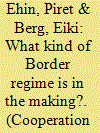

|
|
|
| 10 |
ID:
181026


|
|
|
|
|
| Summary/Abstract |
The Kosovo case remains topical for understanding the practice of state recognition, especially in the context of secessionist claims to independence. The diversity of reactions of third states to Kosovo’s declaration of independence finds basis on the gaps of international law that allow politics to play out in the practice of state-recognition. This analysis takes a closer look at arguments used by third states in their recognition practices related to Kosovo. It compares and contrasts the differing reactions to Kosovo’s claim to independence and deconstructs the politics of recognition with the help of Qualitative Content Analysis. This enquiry identifies ‘earned sovereignty’, ‘regional peace and stability’, and the ‘EU/NATO perspective’ as the main themes used for justifying Kosovo’s recognition. In essence, the practice of state recognition is both a legal and political act needing to be analysed in light of the political considerations of third states.
|
|
|
|
|
|
|
|
|
|
|
|
|
|
|
|
| 11 |
ID:
114099
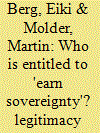

|
|
|
|
|
| Publication |
2012.
|
| Summary/Abstract |
Abkhazia and Nagorno-Karabakh are internationally unrecognised political entities, or so-called de facto states, that have emerged as a result of the incomplete and contested state-formation of their parent states and of the secessionist movements that emerged in the power vacuum of the post-Soviet space. In addition to examining the conventional reliance on the self-determination principle, usually followed by a call for international recognition (as often practised by emerging sovereigns), this article aims to survey whether these political entities have proved that they embody 'rightful authority' as such and whether they 'have earned their sovereignty'. In other words, it attempts to examine the self-determination claims in Abkhazia and Nagorno-Karabakh based on legitimacy criteria that are widely accepted for liberal democratic societies using an analysis of the respective issues as they were represented in focus-group discussions in these two regions.
|
|
|
|
|
|
|
|
|
|
|
|
|
|
|
|
|
|
|
|
|